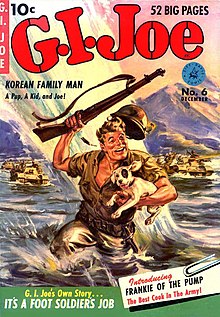Loading AI tools
Comic book genre From Wikipedia, the free encyclopedia
War comics is a genre of comic books that gained popularity in English-speaking countries following World War II.
This article includes a list of general references, but it lacks sufficient corresponding inline citations. (March 2015) |
| War comics | |
|---|---|
 G.I. Joe # 6 (December 1951). Cover art by Norman Saunders. | |
| Authors | |
| Publishers | |
| Publications | |
| Series | |
| Subgenres | |
Shortly after the birth of the modern comic book in the mid- to late 1930s, comics publishers began including stories of wartime adventures in the multi-genre omnibus titles then popular as a format. Even prior to the U.S. involvement in World War II after the attack at Pearl Harbor, Hawaii, comic books such as Captain America Comics #1 (March 1941) depicted superheroes fighting Adolf Hitler and the Nazis.
Golden Age publisher Quality Comics debuted its title Blackhawk in 1944; the title was published more or less continuously until the mid-1980s.
In the post-World War II era, comic books devoted solely to war stories began appearing and gained popularity in the United States and Canada through the 1950s, the 1960s, and 1970s, i.e. covering the time periods of the Korean War and the Vietnam War. The titles tended to concentrate on US military events, generally in World War II, the Korean War, and the Vietnam War. Most publishers produced anthologies; industry giant DC Comics' war comics included such long-running titles as All-American Men of War, Our Army at War, Our Fighting Forces, and Star Spangled War Stories. Another prolific publisher of war comics was Charlton Comics, which produced a wide variety of titles beginning in the 1950s, such as Battlefield Action, Fightin' Army, and Fightin' Marines. Quality also began publishing G.I. Combat during this era. Marvel Comics also produced war titles, notably Sgt. Fury and his Howling Commandos.
In contrast to the typical glamorizing approach of most war titles, the EC Comics titles Frontline Combat and Two-Fisted Tales (produced in the early 1950s) depicted the horrors of war realistically and in great detail, exposing what editor Harvey Kurtzman saw as the truth about war without idealizing it. (The mid-1960s black-and-white comics magazine Blazing Combat, produced by Warren Publishing, was similarly devoted to authentically drawn and researched combat stories with a self-professed anti-war slant.)
Around 1959, several recurring characters began to appear in mainstream comic lines, including Sgt. Rock and The Haunted Tank in the DC line. These recurring characters began as regular "guests" of anthology titles such as Our Army at War and later graduated to their own titles.
By the late 1980s, a great number of venerable war titles (most of which were either anthologies or else World War II-themed titles) from the late 1950s and 1960s "Silver Age of Comic Books" died out. War comics series that ended long runs in the 1980s, following publication of over 100 issues, include:
New titles were still appearing, however – notable among these being Marvel's the 'Nam, which debuted in 1987 and was based during the first year on writer Doug Murray's actual Vietnam experiences (through the eyes of fictional character Ed Marks). Murray was surprised that his proposal for a Vietnam-war themed comic was accepted during this period: "I never expected anything to come of it because war books were already pretty much dead at that point in 1985."[4] Another notable war comic focused on Vietnam was Don Lomax's Vietnam Journal, published by Apple Comics from 1987 to 1991.
Also from Marvel in the 1980s was the toy tie-in G.I. Joe: A Real American Hero which focused on a fictional counter-terrorist team in a contemporary setting, and a limited run of Tales of the Marine Corps, similar in tone and style to Charlton's Fightin' line of war anthologies.
Black and white anthology stories were popular in Britain in the 1960s and early 1970s. Examples include Commando Comics and weekly comics such as Battle Picture Weekly, The Victor, and Warlord.
Trade paperback reprint collections of war comics include:
Seamless Wikipedia browsing. On steroids.
Every time you click a link to Wikipedia, Wiktionary or Wikiquote in your browser's search results, it will show the modern Wikiwand interface.
Wikiwand extension is a five stars, simple, with minimum permission required to keep your browsing private, safe and transparent.